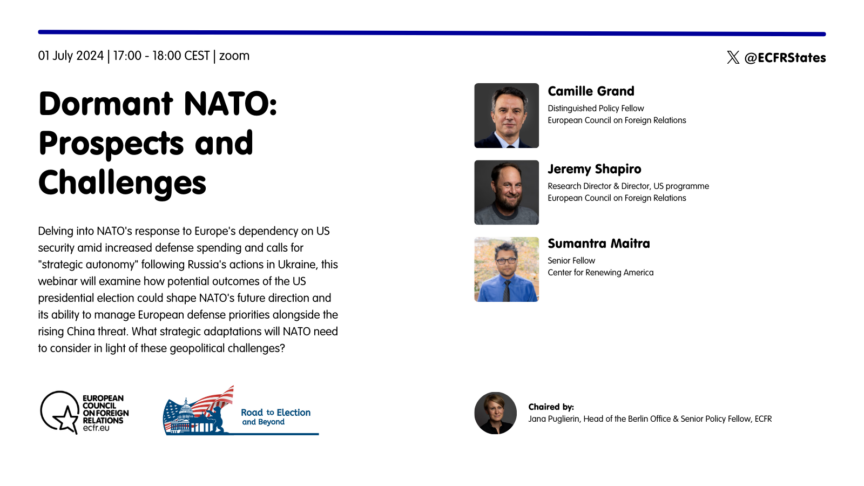
Dormant NATO: Future Prospects and Challenges
Russia’s war against Ukraine has shown how much the Europeans are still dependent on the US to ensure their security, despite all the talk of…

Russia’s war against Ukraine has shown how much the Europeans are still dependent on the US to ensure their security, despite all the talk of…
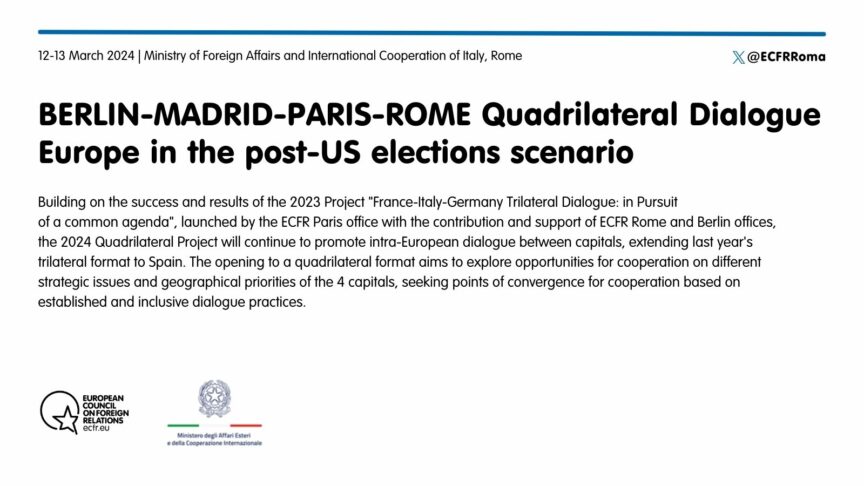
Building on the success and results of the 2023 Project “France-Italy-Germany Trilateral Dialogue: in Pursuit of a common agenda”, the 2024 Quadrilateral Project will continue to promote intra-European dialogue between capitals, extending last year’s trilateral format to Spain

Terzo appuntamento della prima serie di tre working lunch realizzati congiuntamente da ECFR Roma, SDA Bocconi e l’Institute for European Policymaking @ Bocconi University
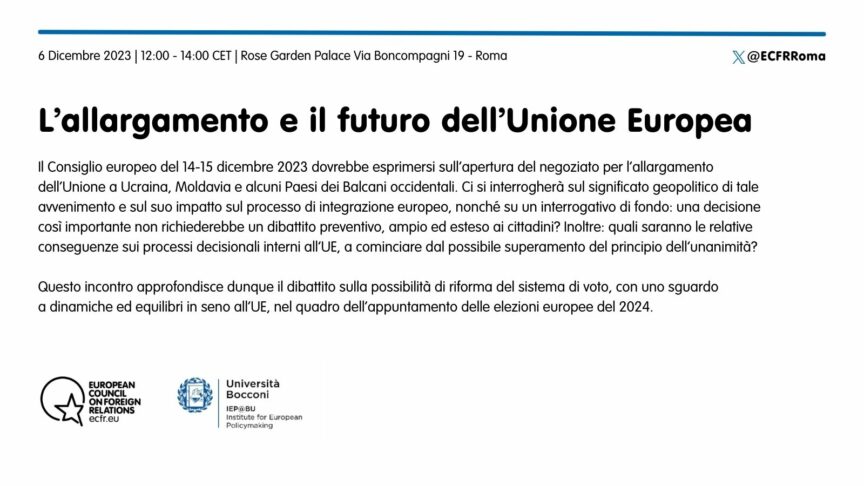
Secondo appuntamento di una serie di tre working lunch realizzati congiuntamente da ECFR Roma, SDA Bocconi e l’Institute for European Policymaking @ Bocconi University
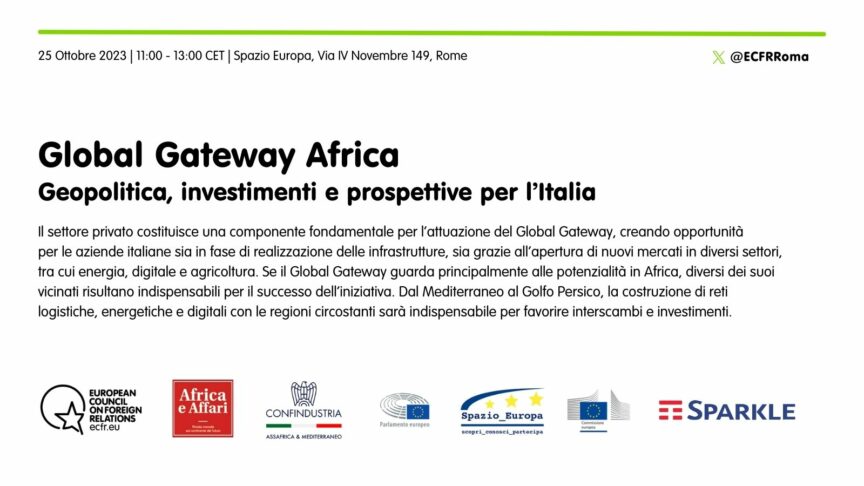
L’evento si concentrerà su come Il settore privato costituisca una componente fondamentale per l’attuazione del Global Gateway e sulle opportunità che questo può rappresentare
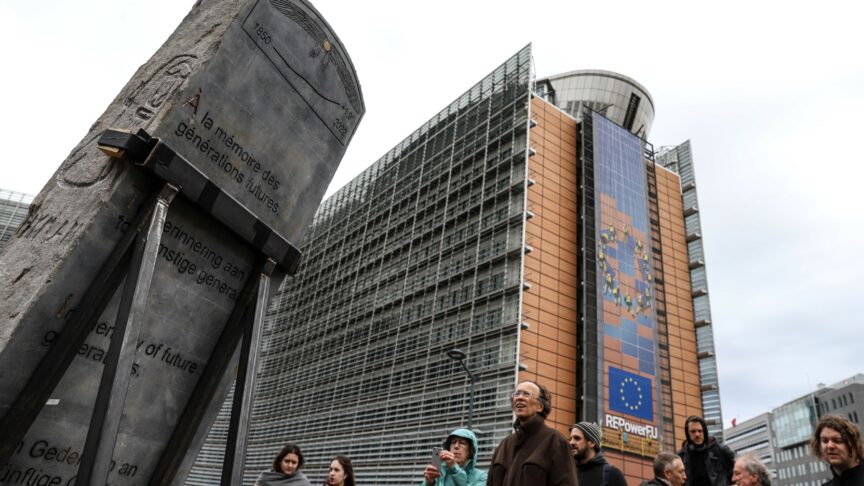
If Europeans pull back on their climate obligations, they will endanger both their green agenda and their competitiveness
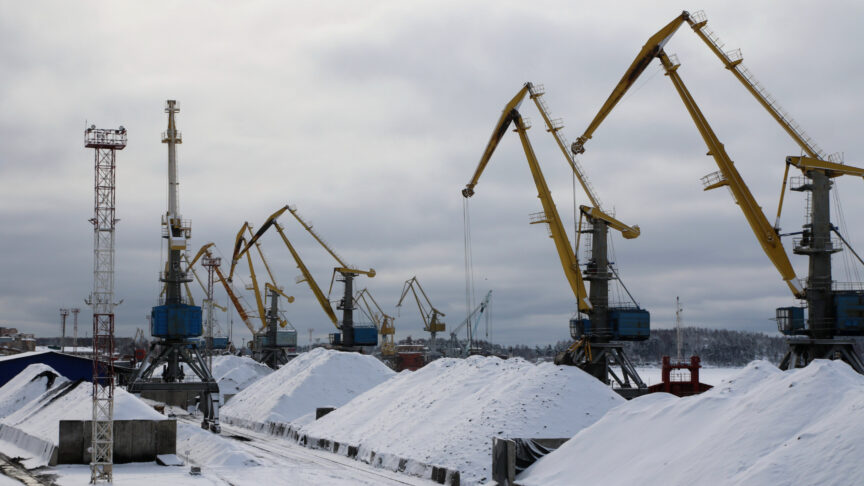
The EU and its member states are applying tools of economic statecraft. Now is the time for a full assessment of how well they have worked
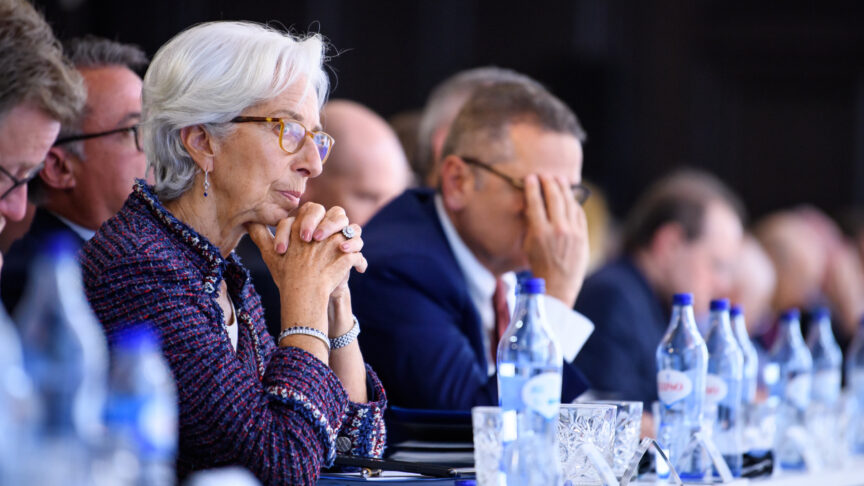
If the ECB is disciplined in its use of the recently announced Transmission Protection Instrument, this could turn out to be exactly what Europe needs
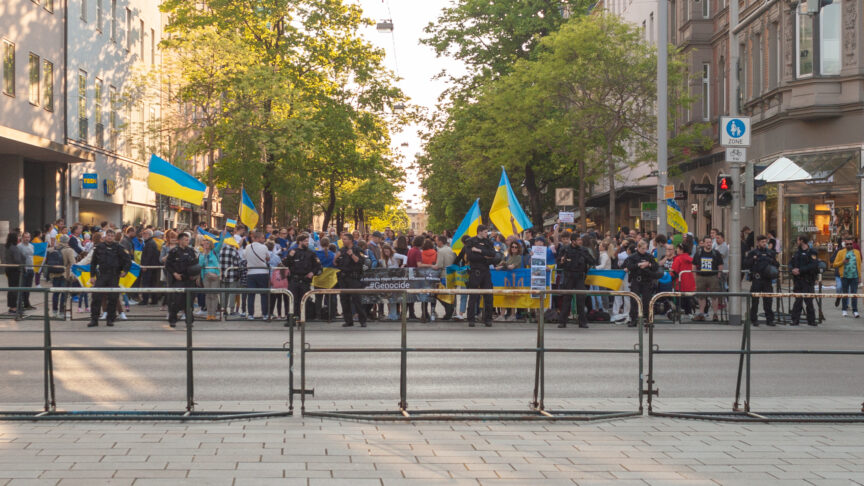
The holiday period could erode public interest in Ukraine. Europeans should recognise that their attitudes towards Russia’s war on the country have consequences
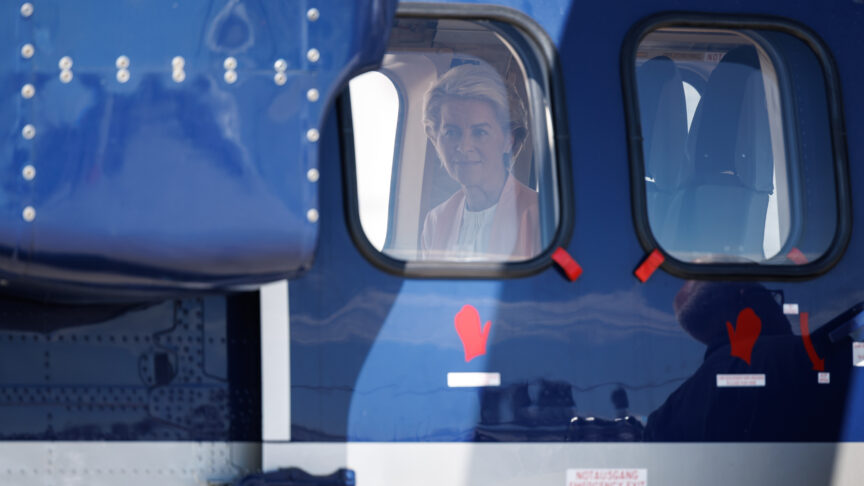
Europeans have set out on a journey towards greater economic sovereignty. They will only reach their destination if they learn to navigate an interconnected world
Spain, and Europe, need a new story about migration – it remains to be seen how the country will put this into practice
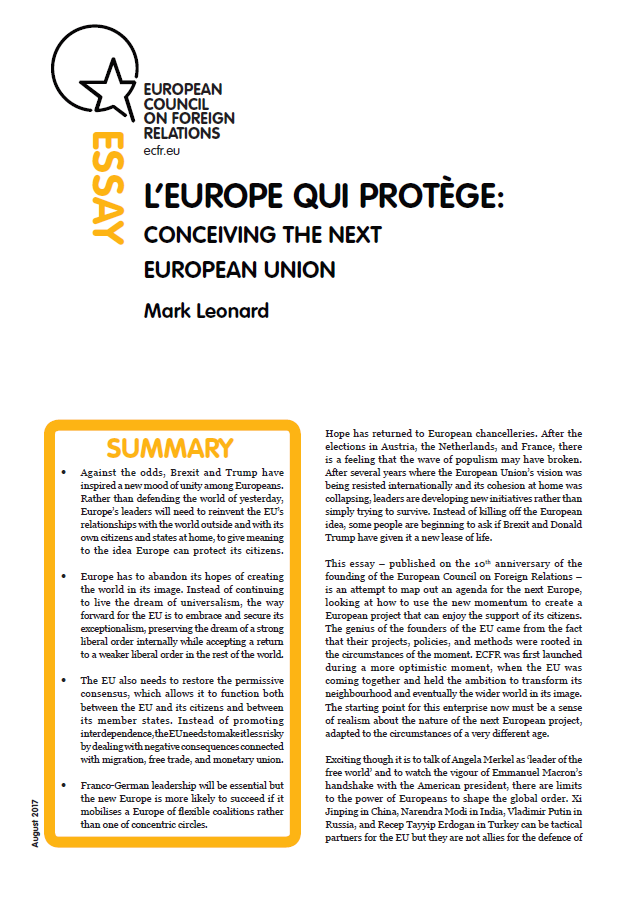
The EU’s survival depends on protecting its citizens from the forces it has created
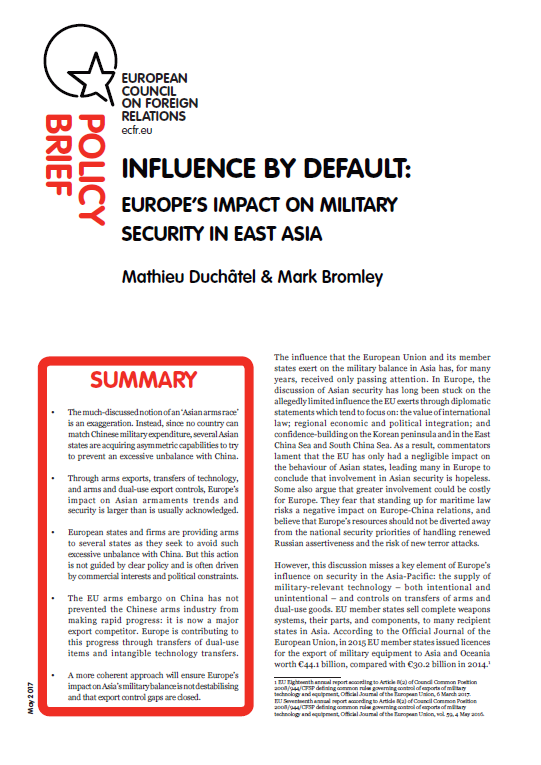
In the continued absence of a policy, European commercial actions in the armament sector could have a destabilising impact on Asian security
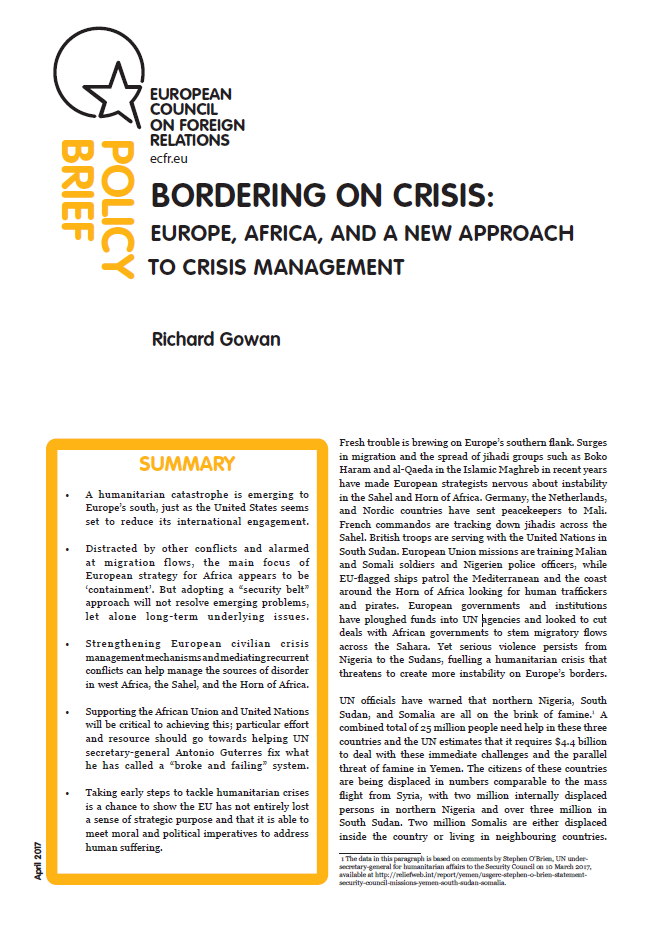
Taking early steps to tackle humanitarian crises is a chance to show the EU has not entirely lost a sense of strategic purpose and that it is able to meet moral
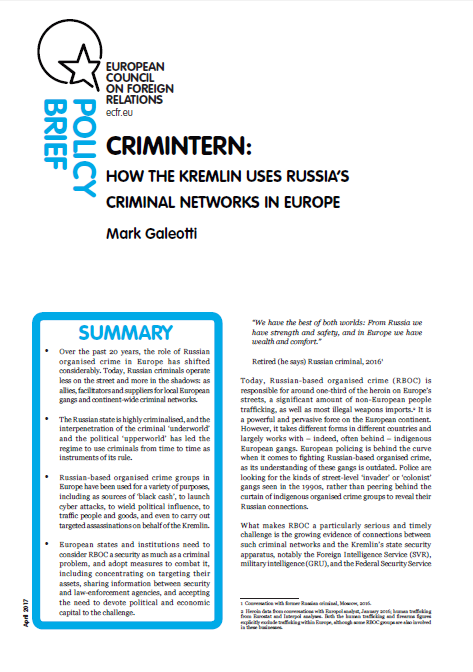
European states and institutions have to consider the challenges posed by Russian-based organised crime, and adopt measures to combat it
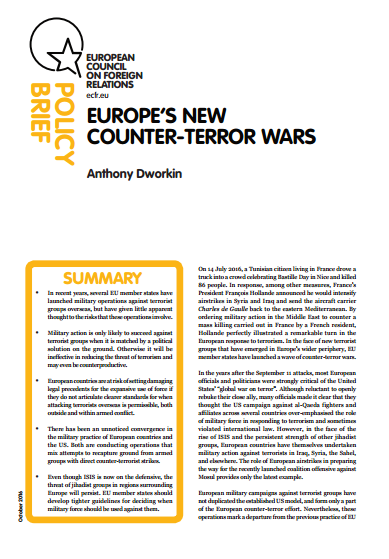
European counter-terror wars risk failing to prevent attacks while weakening international law

A British exit from the EU would make it harder to fight crime and terrorism, reduce Britain’s ability to lead and influence its partners, and weaken NATO
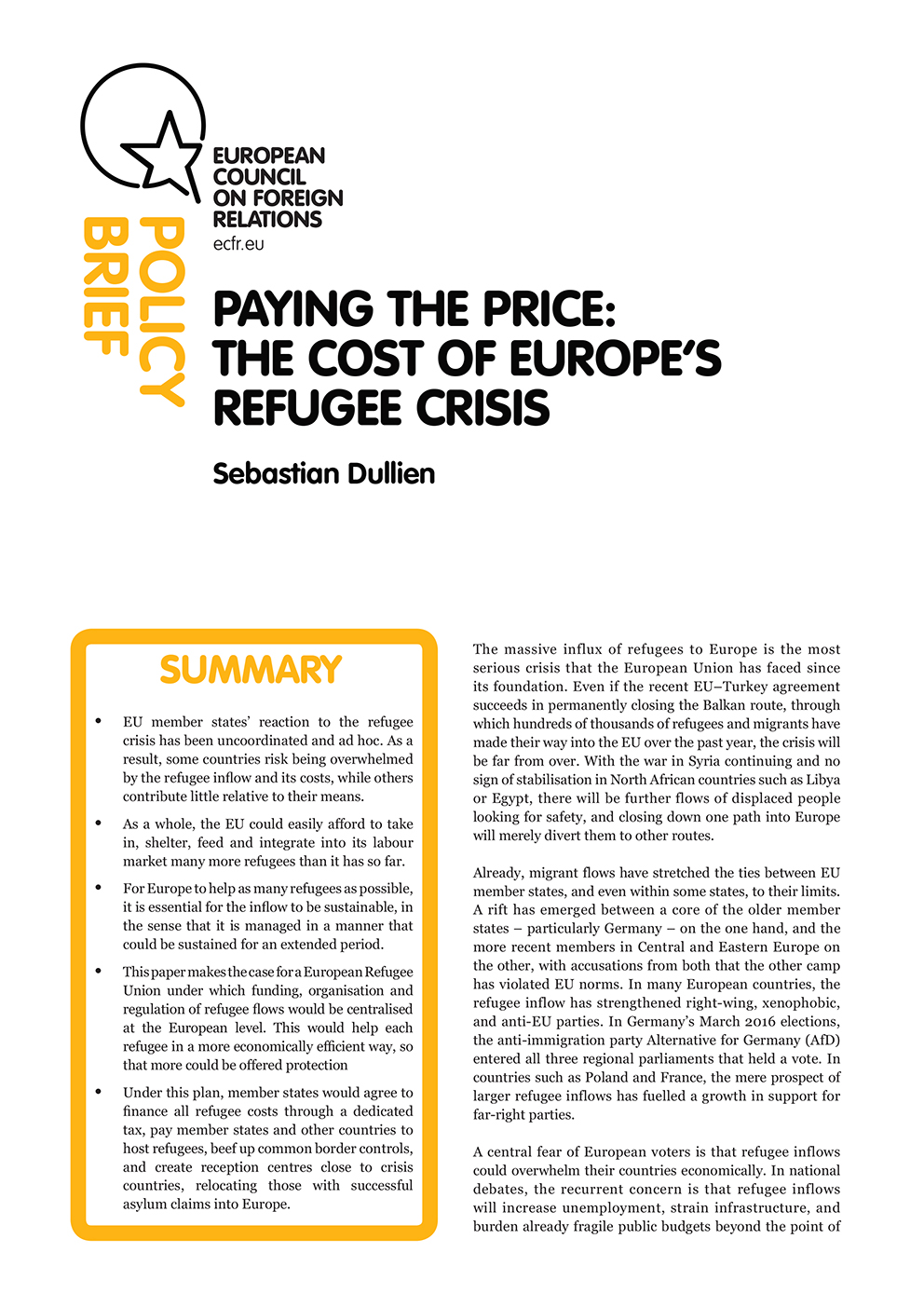
Europe can more sustainably and cost-efficiently handle refugee arrivals by centralising management at a European level
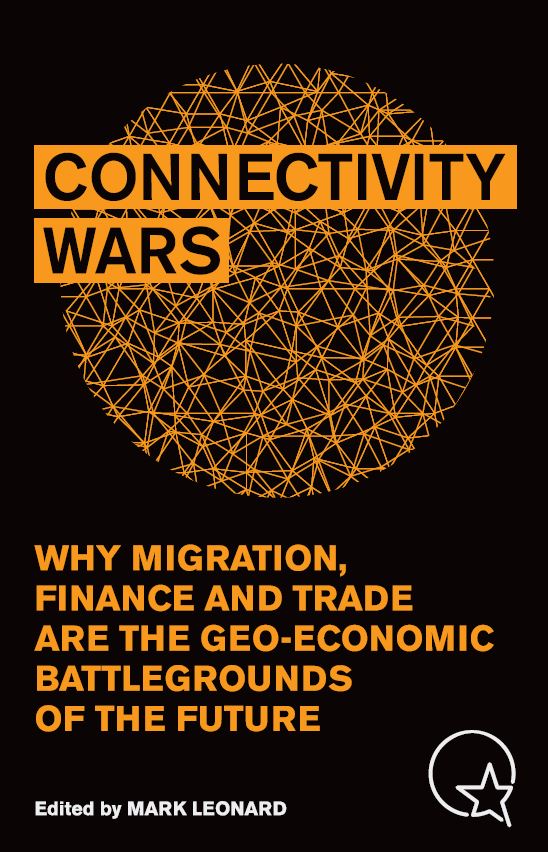
Why migration, finance and trade are the geo-economic battlegrounds of the future
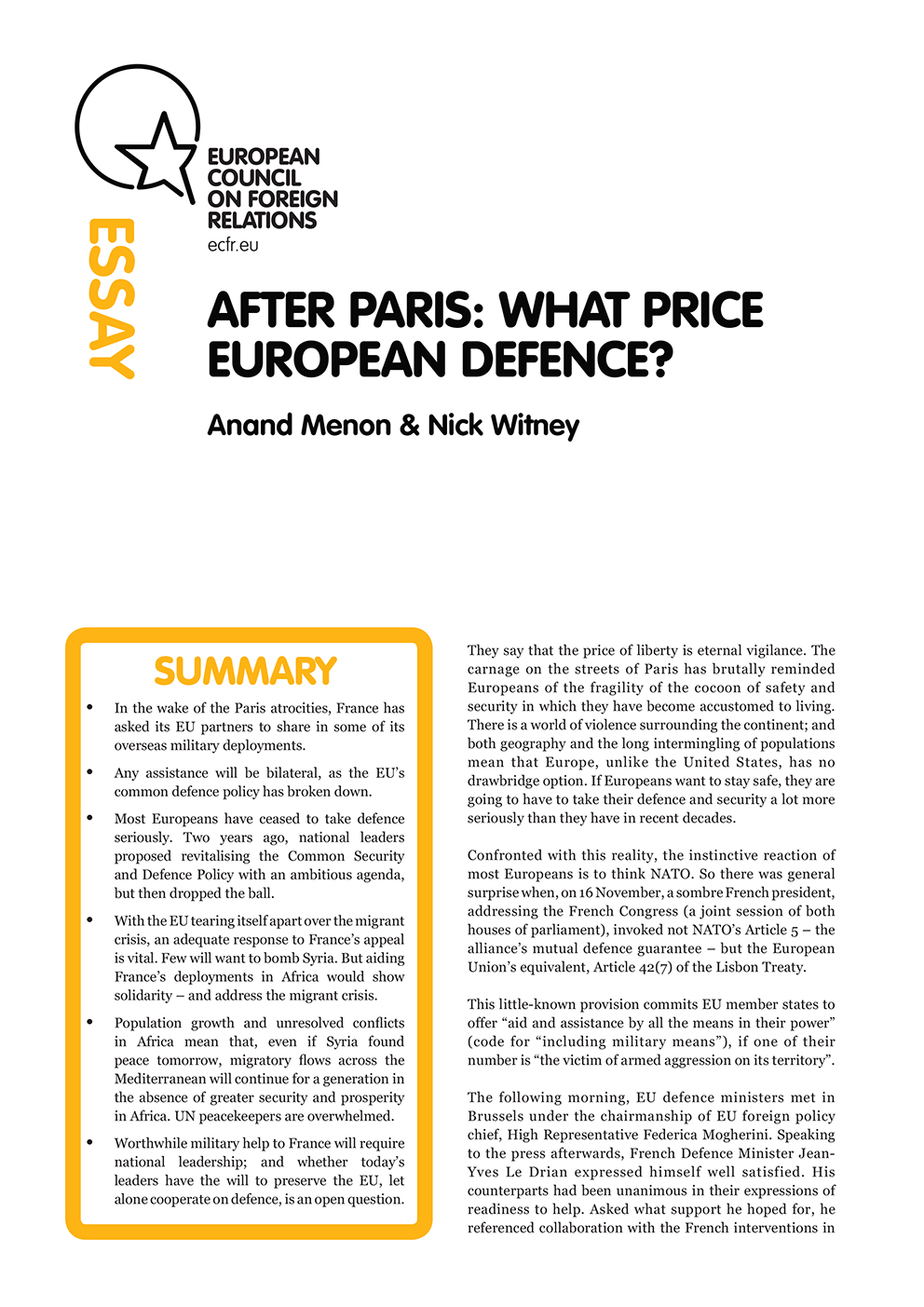
Following France’s call for European solidarity under Article 42.7, European states should rekindle defence cooperation and aid France’s deployments in Africa

If Europeans pull back on their climate obligations, they will endanger both their green agenda and their competitiveness

The EU and its member states are applying tools of economic statecraft. Now is the time for a full assessment of how well they have worked

If the ECB is disciplined in its use of the recently announced Transmission Protection Instrument, this could turn out to be exactly what Europe needs

The holiday period could erode public interest in Ukraine. Europeans should recognise that their attitudes towards Russia’s war on the country have consequences

Europeans have set out on a journey towards greater economic sovereignty. They will only reach their destination if they learn to navigate an interconnected world
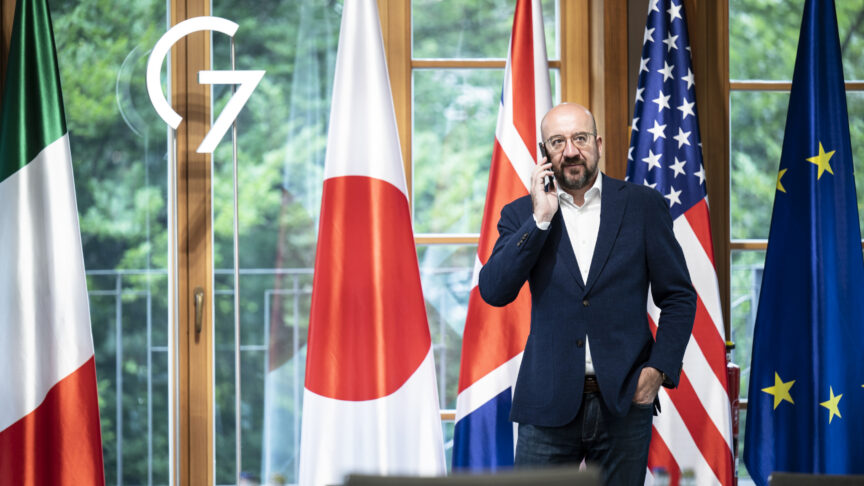
The EU has made insufficient progress in enhancing its sovereignty, particularly in security and defence. The union now needs to overcome internal differences to bolster its external ability to act

The EU needs a sanctions doctrine – a framework to set out the goals, means, and risks for the use of economic measures

No hating any time – except between Facebook and Moscow? Who governs hate online speech sheds light on the long way to go to recreating the internet as a global commons
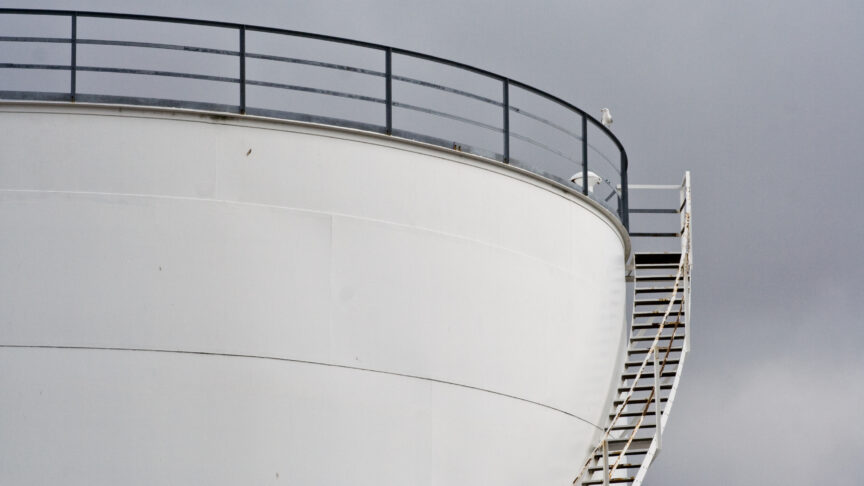
In the wake of the EU’s latest set of sanctions, European leaders should work quickly to take control of the narrative around sanctions

The still-incomplete web of allies and institutions that the EU has woven in the Balkans in the last 30 years is not only strong but also valuable to its geopolitical struggle against Russia
A critical mass of countries agree on the need for more flexible cooperation, but what could it look like?

Humanitarian crises in places like Afghanistan, Yemen or Ethiopia are not only a reflection of internal turmoil – but mirror a much grander development: system failure
The over 90-hour European Council summit in Brussels ended with a deal on a €1.82 trillion financial package. What does…
In his opening remarks at our virtual Annual Council Meeting, German Foreign Minister Heiko Maas, spoke about Germany’s Presidency of the Council of the EU…
The coronavirus crisis brought about financial hardship for the European Union, and many agree that a recovery fund would be needed to overcome it. In…
The recent Franco-German proposal for an EU recovery fund sparked a lively debate on possible changes in EU’s nature, suggesting that the plan to raise…
During the Munich Strategy Forum 2019, host Mark Leonard sat down Toomas Ilves, the former president of Estonia aka the first smart country and “digital…
The multilateral system faces three related crises of power, relevance, and legitimacy. This fraying consensus threatens the EU, which is committed to multilateralism. But the…
Anthony Dworkin steps in for Mark Leonard and speaks with Jose Ignacio Torreblanca, Federica Paddeu, and Sergey Sukhankin, about what risks the recognition of Juan…
Anthony Dworkin speaks with Gerald Knaus about how the EU can protect human rights and prevent rising illiberalism. Bookshelf: Moral Tribes by Joshua…
Mark Leonard speaks with Erica Moret and Manuel Lafont Rapnouil about European sanctions policies, secondary sanctions and counter measures. The podcast was recorded on the…

Russia’s war against Ukraine has shown how much the Europeans are still dependent on the US to ensure their security, despite all the talk of…

Building on the success and results of the 2023 Project “France-Italy-Germany Trilateral Dialogue: in Pursuit of a common agenda”, the 2024 Quadrilateral Project will continue to promote intra-European dialogue between capitals, extending last year’s trilateral format to Spain

Terzo appuntamento della prima serie di tre working lunch realizzati congiuntamente da ECFR Roma, SDA Bocconi e l’Institute for European Policymaking @ Bocconi University

Secondo appuntamento di una serie di tre working lunch realizzati congiuntamente da ECFR Roma, SDA Bocconi e l’Institute for European Policymaking @ Bocconi University

L’evento si concentrerà su come Il settore privato costituisca una componente fondamentale per l’attuazione del Global Gateway e sulle opportunità che questo può rappresentare
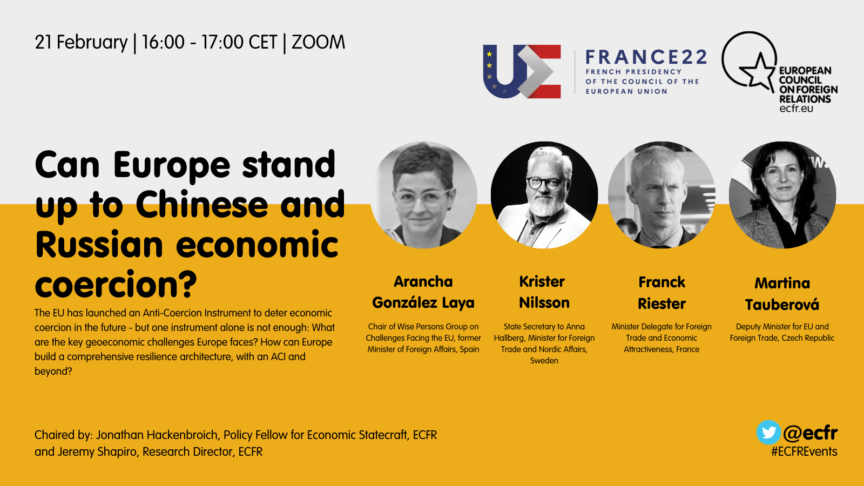
The European Council on Foreign Relations in the context of the French Presidency of the Council of the EU is delighted to invite you to a debate on the principles that should guide Europe’s quest for economic sovereignty
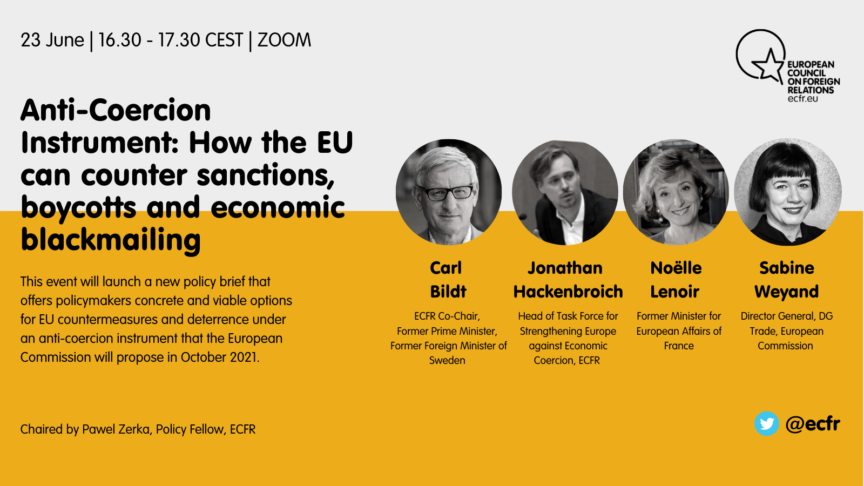
This event is the second webinar in a two-part series on current developments in the global use of economic coercion
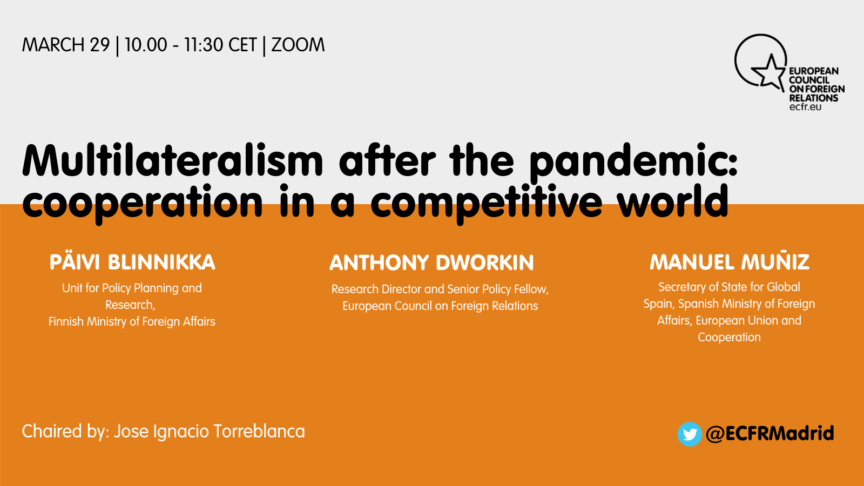
The COVID-19 pandemic has brought a changing international order into sharp focus, highlighting both our heightened interdependence and also the obstacles to global cooperation. As…
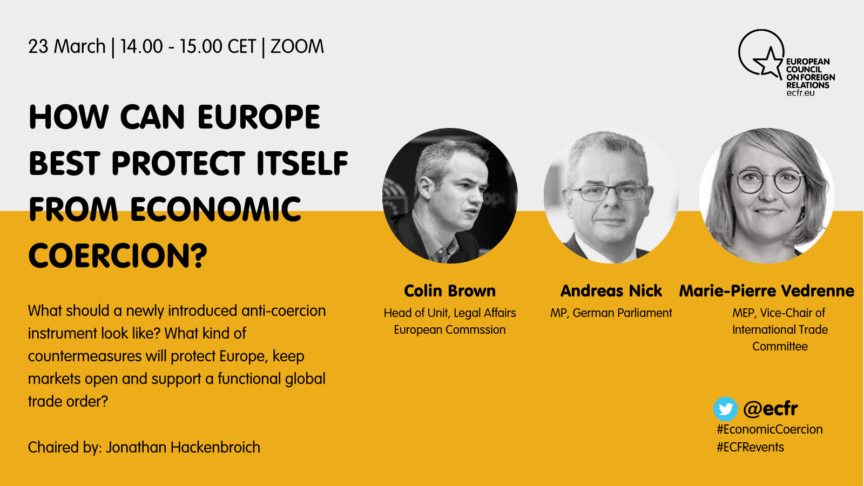
What kind of countermeasures will protect Europe, keep markets open and support a functional global trade order?
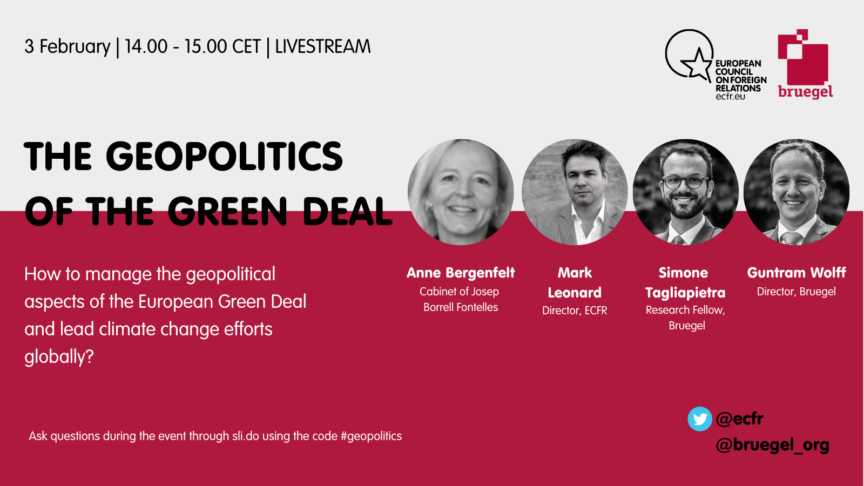
How to manage the geopolitical aspects of the European Green Deal and lead climate change efforts globally